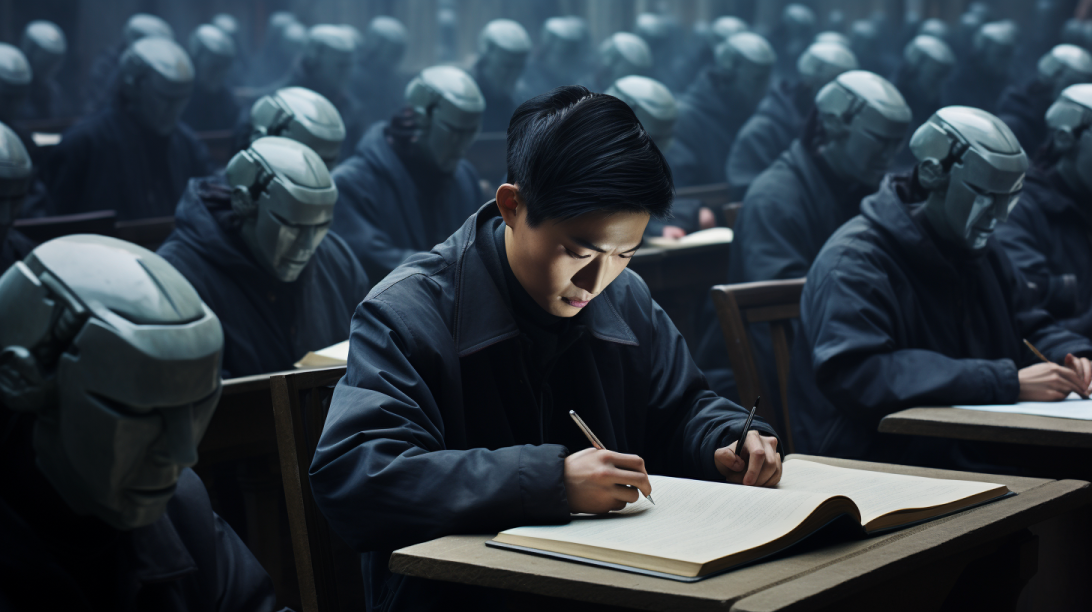Photo was created by Webthat using MidJourney
In a pivotal move, China’s educational landscape is poised for transformation as draft laws on the use of artificial intelligence in academic contexts surface. The impact of AI-generated content, such as that produced by ChatGPT, has ignited debates about innovation, ethics, and academic integrity. As the nation grapples with the unprecedented challenges posed by AI, the proposed legislation, if passed, could reshape how students create and submit their assignments.
1. The Unveiling of AI in Academia
With draft laws under consideration, China’s educational realm is entering uncharted waters. For the first time, lawmakers are addressing the pervasive use of AI, particularly AI-generated writing, in academic settings. This legislative venture reflects the rising concerns surrounding the authenticity and originality of student submissions.
2. Risking It All: Degrees in Jeopardy
A stark implication of these draft laws is that students found utilizing AI for paper composition could face the dire consequence of losing their hard-earned degrees. This potential repercussion signifies a decisive step toward upholding the sanctity of academic achievement. The proposed measure underscores the gravity of preserving the intrinsic value of education and knowledge acquisition.
Related Reading: AI Terminology: Your Ultimate Guide to Essential Understanding
3. A Legal Milestone: Navigating AI and Academia
The law in question stands as a groundbreaking endeavor. As China sets the precedent for addressing AI’s role in academia, it grapples with ethical dilemmas that have global resonance. This landmark move demands a delicate balance between encouraging technological innovation and maintaining the credibility of educational accomplishments.
4. The Specter of Plagiarism
One of the driving forces behind these draft laws is the growing concern about plagiarism facilitated by AI-generated content. The ease of producing papers with little to no original input raises ethical concerns about academic honesty. As educational institutions aim to uphold rigorous standards, the intersection of AI and student work has ignited a contentious debate.
Related Reading: Coping with Artificial Intelligence: Navigating the Evolution of Learning
5. Evolution of Legislation: From Fraud to AI
Interestingly, the initial version of the law, released for public consultation in 2021, focused solely on academic fraud unrelated to AI. However, the updated version explicitly incorporates AI usage. This amendment signifies the rapid evolution of technology and the pressing need to adapt legislation to address emerging challenges.
6. The Gatekeepers of Education: Lawmakers and Committees
The draft law’s journey through the legislative process adds layers of significance to its potential impact. Submitted by the States Council, it now awaits review by the Standing Committee of the National People’s Congress. This meticulous scrutiny exemplifies the seriousness with which the matter is being treated, underscoring the desire to make informed decisions about AI’s role in education.
Related Reading: Navigating the AI Revolution in Schools
7. Upholding Integrity: Degrees, Identities, and Bribes
Beyond AI-generated content, the draft law also tackles the broader issue of academic integrity. It empowers authorities to revoke degrees obtained through fraudulent means, including identity theft and bribery. This comprehensive approach aims to restore confidence in the education system’s integrity.
8. Growing Concerns: ChatGPT and Its Impact
The emergence of ChatGPT as a market leader has intensified worries about AI misuse. While not officially available in China, the prevalence of methods to access such technology highlights its potential for misuse. The existence of similar Chinese chatbots further complicates the ethical landscape surrounding AI-generated content.
Related Reading: AI Art and Copyright: Navigating the Emotive Landscape
9. The Social Media Conundrum
A cursory glance at Chinese social media platforms reveals a proliferation of guides on leveraging generative AI tools for paper writing. This accessibility raises questions about the ease with which students can turn to AI for assistance. The prevalence of such resources underscores the need to address this issue swiftly.
10. AI: A Double-Edged Sword
As AI’s influence grows, so does its potential for misuse. Reports have highlighted instances where students employed AI for writing papers and assignments. The conveniences of technology clash with concerns over academic rigor, prompting institutions worldwide to introduce guidelines on AI usage to maintain educational integrity.
Related Reading: Exploring the Future of AI-Generated Book Reviews
11. A Global Perspective: Rules and Regulations
China is not alone in addressing the AI-education nexus. Universities and academic journals worldwide are grappling with the integration of AI-generated content. Institutions like China’s Jinan University and the University of Hong Kong have already implemented rules governing AI usage, showcasing the global impact of this critical issue.
12. Embracing Technology: From Ban to Teaching Aid
The University of Hong Kong’s journey with AI typifies the evolving stance on technology in education. After imposing a temporary ban, the university now permits AI tools as teaching aids. This pivot demonstrates the nuanced approach institutions are taking to navigate the uncharted waters of AI’s educational applications.
Related Reading: Artificial Intelligence in Education: What Parent’s Say?
13. The Voices of Expertise
Zhou Yongmei, a professor from Peking University, emphasizes the importance of stakeholder consultation when addressing this groundbreaking legislation. Engaging with educators, students, administrators, and law enforcement agencies is crucial to understanding AI’s multifaceted impacts. Clarity in defining AI-related terms and detection methods will be pivotal for effective enforcement.
14. The Path Forward: Balancing Innovation and Regulation
The draft law’s effectiveness hinges on its ability to strike a delicate equilibrium. Encouraging innovation while deterring misuse is a complex task. As China forges ahead, it paves the way for other nations to confront the ethical, technological, and educational challenges posed by AI.
15. Forging a New Educational Paradigm
In a landscape driven by innovation, China’s draft laws mark a significant chapter in the story of AI’s integration into education. As the global community watches, this legislative effort signals a resolute commitment to preserving the essence of education in an era dominated by technology. Striking the right balance will shape the educational landscape for generations to come.


